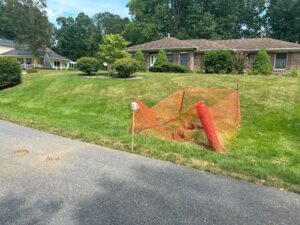Case Study: Congressional Court Sinkhole Stabilization

 Problem
Problem
In a Pennsylvania municipality, persistent geological challenges had created an environment prone to recurring sinkholes and demanded a more sustainable solution. The local geology contributed to ongoing subsurface instability and roadway sinkholes that posed a risk to those nearby. This recurring issue also posed a threat to infrastructure, particularly around a critical sewer line. The municipality faced mounting concerns over the costs and potential downtime related to continuous repairs. This sinkhole issue had recurred five times in six years, making it clear that a lasting solution was urgently needed.
Solution
Utility Services Group was called in to address the problem. Given the complexities of the site, the team employed a trenching slide rail system to ensure safe shoring during operations. They utilized deep soil injection with NCFI’s TerraThane 24-003 polyurethane formula, a durable and effective solution for stabilizing unstable soils. The injection was conducted in three stages—at depths of 5 feet, 10 feet, and 15 feet below the sewer line—to provide comprehensive support to the compromised area. Additionally, a camera was used throughout the process to monitor underground conditions, ensuring the protection of the existing sewer infrastructure.
Results
The project was completed in a week and two days, with Utility Services Group successfully stabilizing the recurring sinkhole without causing any damage to the sewer line. The deep soil injection approach not only resolved the recurring sinkhole but also proved to be a cost-effective and time-saving solution for the municipality. By addressing the underlying geologic issues and reinforcing the soil, the municipality was able to avoid further disruptions and long-term expenses associated with repeated sinkhole incidents.


